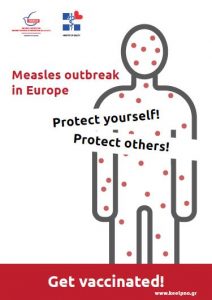The Facts
Measles is a highly contagious disease transmitted through human-to-human contact but also in public spaces, even in the absence of person-to-person contact. Following exposure, approximately 90 percent of susceptible individuals will develop measles.
Symptoms of measles include:
- Fever
- Feeling sick, like with a cold
- Loss of appetite
- Spots in the mouth – These can look like grains of salt.
- Red, runny eyes, extra sensitive to bright light
- Sneezing and coughing
- A sore throat
- A red rash that can form red patches and starts on the face and spreads to the body.
The duration of the incubation period is 10 to 12 days
A person is typically contagious:
- 5 days prior to rash eruption and
- 4 days after rash eruption
People who are at risk for measles include:
- Children too young to get a measles shot
- People who have never had a measles shot
- People who did not get a second measles shot
- People who got a shot that did not work well
Some people have a higher risk of serious problems from measles. They include:
- Pregnant women (miscarriage, premature delivery, low birth-weight infants)
- Babies
- People with HIV/AIDS or cancer
- People who do not get enough food or vitamins
- Very old people
Measles can only be prevented through effective vaccination
Measles Outbreak in Greece (KEELPNO)
Data provided as of 29/3/2018:
- 2345 cases
- No deaths reported
Most cases are:
- Children in the Roma community and
- 25-44 years of age in the general population that had not received their 2nd dose vaccination or never been vaccinated against Measles
Vaccination is the key public health action to prevent Measles

Recommendations during Measles Outbreak
(Hellenic Ministry of Health- National Vaccination Committee)
- Immediate vaccination is recommended for all children, adolescents and adults that have not received the complete two-dose vaccination schedule
- Children, adolescents and adults born after 1970 that have not previously had measles or been vaccinated, must receive a two-dose measles vaccination through the monovalent vaccine for measles or the trivalent MMR
Routine Pediatric Vaccination Schedule
(Hellenic Ministry of Health- National Vaccination Committee)
1st dose:
- At 12 months old
2nd dose:
- At 3 months after the 1st dose or
- In case of delay, as soon as possible following 3 month period after 1st dose
- In high risk cases, the 2nd dose can be given 4 weeks following the 1st dose
References: World Health Organization, KEELPNO, US Center for Disease Control and Prevention
For further information, please visit:
- The KEELPNO website at http://www.keelpno.gr
- The US CDC website at https://www.cdc.gov/
- The WHO website at http://www.who.int/en/
You can also read the article in Greek language here.

